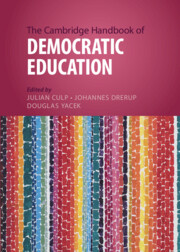Book contents
- The Cambridge Handbook of Democratic Education
- Cambridge Handbooks in Education
- The Cambridge Handbook of Democratic Education
- Copyright page
- Contents
- Contributors
- Acknowledgments
- Introduction
- Part One Historical Perspectives
- 2 Plato on Democratic Education
- 3 Aristotle on Education, Democracy, and Civic Friendship
- 4 Rousseau on Democratic Education
- 5 Dewey on Democratic Education
- 6 Hannah Arendt on the Very Possibility of Democratic Education
- 7 Paulo Freire on Democratic Education
- 8 Rabindranath Tagore on Democratic Education
- Part Two Philosophical and Normative Foundations
- Part Three Key Topics and Concepts
- Part Four Challenges
- Index
- References
3 - Aristotle on Education, Democracy, and Civic Friendship
from Part One - Historical Perspectives
Published online by Cambridge University Press: 20 April 2023
- The Cambridge Handbook of Democratic Education
- Cambridge Handbooks in Education
- The Cambridge Handbook of Democratic Education
- Copyright page
- Contents
- Contributors
- Acknowledgments
- Introduction
- Part One Historical Perspectives
- 2 Plato on Democratic Education
- 3 Aristotle on Education, Democracy, and Civic Friendship
- 4 Rousseau on Democratic Education
- 5 Dewey on Democratic Education
- 6 Hannah Arendt on the Very Possibility of Democratic Education
- 7 Paulo Freire on Democratic Education
- 8 Rabindranath Tagore on Democratic Education
- Part Two Philosophical and Normative Foundations
- Part Three Key Topics and Concepts
- Part Four Challenges
- Index
- References
Summary
This chapter addresses Aristotle’s conception of the civic purposes of education, how the education he proposes would serve those purposes, his stance toward democracy and democratic education, and the compatibility of the education he proposes with a democratic society and system of government. It argues that his educational proposals aim to facilitate a partnership of all citizens in living the best kind of life and are thus focused on cultivating moral and intellectual virtues and educating diverse children together with a view to nurturing civic friendship. It concludes that Aristotle defends forms of shared governance in the common interest that would qualify as limited forms of democracy and that the education he proposes is recognizably democratic. Despite their elitist limitations, his works offer significant resources for understanding democracy and democratic education, most notably his conception of the role of common schools in promoting civic friendship and shared governance.
Keywords
- Type
- Chapter
- Information
- The Cambridge Handbook of Democratic Education , pp. 29 - 44Publisher: Cambridge University PressPrint publication year: 2023
References
- 2
- Cited by

